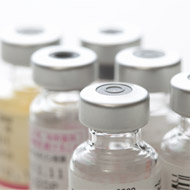UK veterinary antibiotic sales lowest in 25 years

Sales of the highest priority critically important antibiotics fell by 29 per cent between 2016 and 2017.
Sales of veterinary antibiotics in the UK have fallen to their lowest level in 25 years, according to a report published by the Veterinary Medicines Directorate.
The 2017 UK Veterinary Antibiotic Resistance and Sales Surveillance (VARSS) report shows that sales of veterinary antibiotics fell by 18 per cent between 2016 and 2017 to reach a low of 37mg/kg. Sales have also fallen 40 per cent since the publication of the UK AMR strategy in 2013.
The report also found that sales of the highest priority critically important antibiotics fell by 29 per cent between 2016 and 2017 to 0.8 per cent of sales.
Rural affairs and biosecurity minister Lord Gardiner said: “These results show an encouraging reduction of antibiotic use in pigs, poultry and other food-producing animals. I hope that the results will set a further example for our food and farming sectors to tackle the threat of antimicrobial resistance.
“As we know, good farm management, biosecurity and animal husbandry systems are crucial to achieving this.
The UK’s chief veterinary officer, Christine Middlemiss, added: “A 40 per cent drop in sales of antibiotics for use in food-producing animals between 2013 and 2017 is an excellent achievement. This is the result of year-on-year improvement in training, stewardship, stockmanship and disease control.
“I praise the industry for their commitment to successfully deliver responsible use of antibiotics and reductions. We must continue to champion infection prevention and disease control to ensure high animal health standards and the optimised use of antimicrobials.”
The VARSS report provides the previous years’ data on the quantity of authorised antibiotics for use in animals sold throughout the UK and results from surveillance programmes looking at antibiotic resistance in animals.
This year’s report for the first time presents data on the use of antibiotics in the beef, trout and salmon industries, in addition to meat poultry pig, dairy, game bird and laying hens industries.



 The latest
The latest